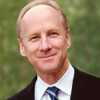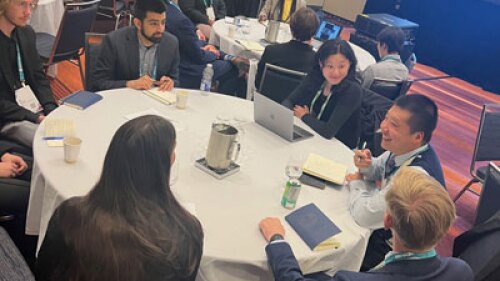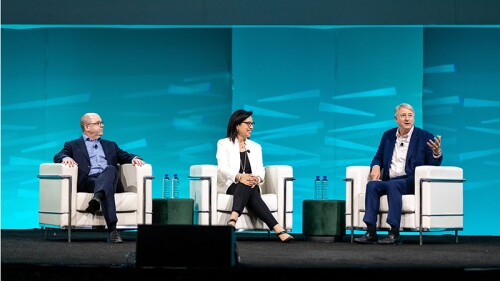I am very pleased to report that ULI’s recent Spring Meeting in Vancouver was an extraordinary success. The event drew more than 3,100 attendees, far exceeding our expectations for the first Spring Meeting held outside the United States in 29 years (we convened in Toronto in 1985). The appeal of the meeting was definitely enhanced by the location: Vancouver is an incredibly attractive, progressive city, and the meeting served as a great opportunity to showcase the fine work of ULI British Columbia.
We had an impressive lineup of speakers discussing topics as specific as the most popular amenities for microhousing and as broad as global economic and political trends. Vancouver Mayor Gregor Robertson shared thoughts on the city’s rise as a global gateway known for its high livability, while CNN commentator and Washington Post columnist Fareed Zakaria told us that the future will be influenced more by local government innovation in cities around the world than by action (or inaction) by a nation’s leaders. The combination of compelling content and ample networking opportunities, all delivered in a stunning setting, made this Spring Meeting a particularly rich experience that bolstered the power of ULI convenings as a way to connect, learn, and share.
The upbeat tone of the meeting and the enthusiastic response from attendees reinforced my optimism about the continued recovery for the industry and the bright outlook for the Institute. The state of ULI is strong—not only as measured by our financial results, but also in our ability to measure our global impact. We are beginning to see in our materials a heightened focus on outcomes, not just outputs, with a greater emphasis on the role of our members in leading positive change.
This is documented in our recently published 2013 Annual Report, which covers both ULI and the ULI Foundation, and spotlights the increasingly intertwined nature of the two organizations. The Annual Report is available at uli.org, and I encourage you to take a look. It captures the broad sweep of ULI in a fresh way, connecting content and impact to show how our work affects the quality of people’s lives on a global basis.
ULI has long been known for its rich content—content defined not just by analysis and research publications, but also by the deep knowledge base and experience of ULI members: what you are doing, how you are innovating, and how you are making a difference. This unique practice-based perspective is ULI’s distinctive voice, and a top priority for ULI staff is to fully leverage this content for your benefit.
As a result, we are continuing to refine how we collect and distribute information, and we are taking a much more resourceful approach to funding content, including attracting support from major global foundations. We are also designing a more efficient organization to make the best use of our resources and to integrate information more effectively across our networks. As we continue to refine this process, we want to hear from you on what you would like ULI to provide in terms of practical information you can use in your business or policy decision making on a daily basis.
This practical and tactical approach is one that highlights examples of real information coming from the trench experience of our members. It is what I call the “taproot” of ULI—the heritage of practical, experience-based knowledge that branches into lessons learned. One example of this is our upcoming Building Healthy Places tool kit, which is being prepared as part of our Building Healthy Places initiative. With this tool kit, our work on the initiative is pivoting toward practical information that will be accessible online in a new and exciting format that is instantly accessible when you need it.
While the kit is one project related to a specific program, we are also looking at how we can up our knowledge-sharing capability on a much broader basis. For instance, we are exploring how to extend the ULI product council experience by deriving key lessons from each and applying those on a more global scale.
Much of this is being enabled by ongoing advances in communications technology. We are seeing the embrace of cloud-based computing that coincides with ULI’s evolution as an increasingly decentralized organization. This will result in a dramatic improvement in your ability to conduct business with ULI in terms of functions such as event registrations or product purchases, as well as an ability to navigate ULI content resources and networks to customize your ULI experience.
Through our investment in technology, we are reinforcing and expanding the ULI offering that likely drew many of you to the organization—the exceptional system of networks. And, in keeping with ULI’s global expansion, we are improving the technology capability of our national council system outside the United States to emphasize more effective communications and accelerate growth. We believe the key to membership growth on a global scale is local relevance, presented in the local language, enabled with an investment in technology. This will build on the member-to-member exchanges that are already occurring spontaneously: a delegation from ULI Australia traveled to ULI Japan’s annual conference this spring, and members from ULI U.K. have organized several study visits to cities in North America to tour affordable housing developments.
As a member of ULI, you are instantly a member of a very powerful global network. You have access to ULI resources and ULI teams throughout the world—a world that is increasingly interconnected. You are part of an organization whose membership is showing steady and sustainable growth. (Currently, we have more than 32,000 members, up 9 percent from a year ago). We are aiming to make it easier for you to take advantage of all ULI has to offer you at the local and global level, with the goal of improving your experience. With your continued support, ULI is not just in good shape; it is thriving and ascendant.



